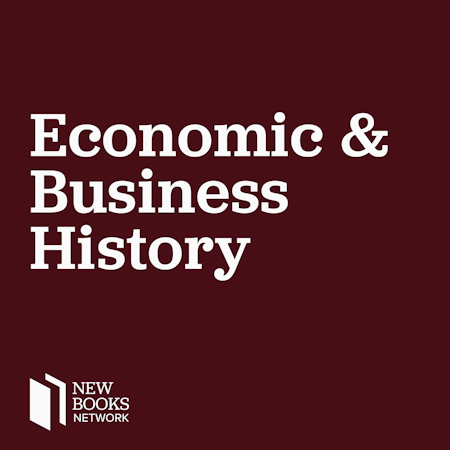
New Books in Economic and Business Hi...
Interviews with scholars of the economic and business history about their new books
1301
Lila Corwin Berman, "The American Jewish Philan...
An interview with Lila Corwin Berman
51 min
1302
Andrew Konove, "Black Market Capital: Urban Pol...
An interview with Andrew Konove
34 min
1303
Paloma Fernández Pérez. "The Emergence of Moder...
An interview with Paloma Fernández Pérez
45 min
1304
Gordon H. Chang, "Ghosts of Gold Mountain: The ...
An interview with Gordon H. Chang
65 min
1305
W. Quinn and J. D. Turner, "Boom and Bust: A Gl...
An interview with William Quinn
48 min
1306
Zach Sell, "Trouble of the World: Slavery and E...
An interview with Zach Sell
69 min
1307
Robert Darnton, "Pirating and Publishing: The B...
An interview with Robert Darnton
48 min
1308
A. Gandhi et al., "Rethinking Markets in Modern...
An interview with A. Gandhi and S. Schwecke
59 min
1309
Andrew Grant Wood, "The Business of Leisure: To...
An interview with Andrew Grant Wood
65 min
1310
Emma Griffin, "Bread Winner: An Intimate Histor...
An interview with Emma Griffin
61 min
1311
K. Yazdani and D. M. Menon, "Capitalisms: Towar...
"Capitalisms" aims to decenter work on the history of capitalism by looking at the longue durée from the tenth century; at regions as diverse as Song China, South and South East Asia, Latin America and the Ottoman and Safavid Empires; and exploring the plurality of developments over this extended time and space...
84 min
1312
J. A. Delton, "The Industrialists: How the Nati...
Delton focuses on the conservative policy goals of the organization but also its surprisingly progressive tactics...
54 min
1313
Ravi Palat, "The Making of an Indian Ocean Worl...
Palat counters eurocentric notions of long-term historical change by drawing upon the histories of societies based on wet-rice cultivation to chart an alternate pattern of social evolution and state formation...
30 min
1314
Joshua Greenberg, "Bank Notes and Shinplasters:...
What is money? No, really, what is money? It turns out the answer is not so simple.
35 min
1315
Joshua B. Freeman, "Behemoth: A History of the ...
Freeman tells the story of the factory and examines how it has reflected both our dreams and our nightmares of industrialization and social change...
58 min
1316
Marcia Chatelain, "Franchise: The Golden Arches...
Chatelain examines the relationship between the fast-food industry, Black business owners, and the communities where they set up franchises after the Holy Week Uprisings of 1968...
67 min
1317
Amy Offner, "Sorting Out the Mixed Economy: The...
Offner shows how strategies such as self-help housing, for-profit privatized state-functions, and austere social programs were well-trodded decades earlier in the mid-century “mixed economy"...
58 min
1318
Lawrence Glickman, "Free Enterprise: An America...
“Free enterprise” is an everyday phrase that connotes an American common sense...
57 min
1319
Michael Zakim, "Accounting for Capitalism: The ...
This is a big story, told through an ostensibly marginal event: the birth of a class of “merchant clerks” in the United States...
75 min
1320
Vicki Howard, "From Main Street to Mall: The R...
41 min
1321
Richard Vague, "A Brief History of Doom: Two Hu...
Vague sees the rise and fall of private sector debt as the key factor explaining the cycle of economic crises experienced by developed and major developing economies over the past two centuries...
33 min
1322
Kris Lane, "Potosí: The Silver City That Change...
In 1545, a native Andean prospector hit pay dirt on a desolate red mountain in highland Bolivia. There followed the world's greatest silver bonanza...
58 min
1323
Michael R. Cohen, "Cotton Capitalists: American...
Michael R. Cohen is Associate Professor of Jewish Studies at Tulane University, where he holds a Sizeler Professorship...
44 min
1324
Caitlin C. Rosenthal, “Accounting for Slavery: ...
The familiar narrative of American business development begins in the industrial North, where paternalistic factory owners, committed to a kind of Protestant ethic, scaled up their operations into ‘total institutions’—an effort to forestall labor turno...
37 min
1325
Rupali Mishra, “A Business of State: Commerce, ...
Though today the public and private sectors are treated as distinct if not separate, the situation was quite different in early modern England. Back then the two were often intertwined, with one of the best examples of this being the English East India...
58 min